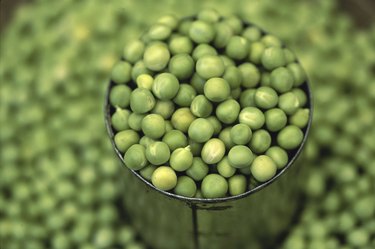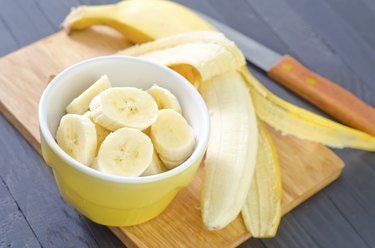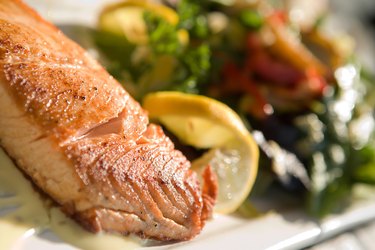
A premature ventricular contraction, also known as PVC, can feel like your heart skipped a beat. Surprisingly, this is common for almost everyone, according to Medline Plus. The problem arises if it happens regularly. If your heartbeat is out of rhythm, it could be caused by your diet. Consult a doctor for proper diagnosis.
Premature Ventricular Contraction
Video of the Day

PVC issues begin in the ventricle. Your heart is divided into four chambers: the two atriums at the top and two ventricles at the bottom. Normally, blood flows into the atria, gets pumped into the ventricle, and is finally pumped out of your heart. The condition of PVC causes the ventricles to contract before they have enough time to fill with blood, thereby causing an arrhythmia. This is an insufficient way to pump blood to your body. Medline Plus reports that when most PVCs occur there is no need for concern or treatment. However, if you have underlying heart conditions and you experience PVCs regularly, you should seek treatment and assess your diet.
Video of the Day
Magnesium

PVC could be caused if you are lacking magnesium in your diet. Magnesium levels in your blood are primarily maintained by dietary intake, along with kidney and intestinal reabsorption. Magnesium levels lower than 1.4 milliequivalents per liter in your blood is considered hypomagnesemia. Low levels of magnesium are known to cause arrhythmias. Including foods that are high in magnesium in your diet may decrease PVCs. These include green vegetables, beans, peas, nuts, seeds and whole, unrefined grains.
Potassium

The concentration of potassium in your blood affects your cells' ability to send electrical impulses to your heart, causing it to contract. Blood potassium levels lower than 3.5 milliequivalents per liter is considered hypokalemia. Severe hypokalemia can cause cardiac hyperexcitability according to Merck Manuals. Hypomagnesemia and hypokalemia are often associated with one another. In fact, hypomagnesemia may actually cause your kidneys to excrete more potassium, resulting in low blood levels. Foods rich in potassium include citrus fruits, bananas, avocados, cantaloupes, tomatoes, potatoes, lima beans, flounder, salmon, cod and chicken.
Decreasing Arrhythmias

The American Heart Association recommends decreasing the use of caffeine, alcohol, tobacco and appetite suppressants if you are experiencing arrhythmias. Implement a heart-healthy diet plan to lose excess weight, reduce your blood pressure, and control cholesterol levels. A heart-healthy diet should include whole grains; fruits; vegetables; other foods high in fiber; lean meat, poultry and fish; and low-fat dairy products. A diet low in saturated and trans fats can help reduce your risk for heart conditions. Also, including exercise into your lifestyle is important. Ask your doctor about starting a new exercise program.
- National Institutes of Health: MedlinePlus: Ectopic Heartbeat (PVCs)
- Merck Manuals: Disorders of Magnesium Concentration
- Office of Dietary Supplements: Magnesium
- Merck Manuals: Disorders of Potassium Concentration
- University of Maryland Medical Center: Potassium
- American Heart Association: Prevention & Treatment of Arrhythmia